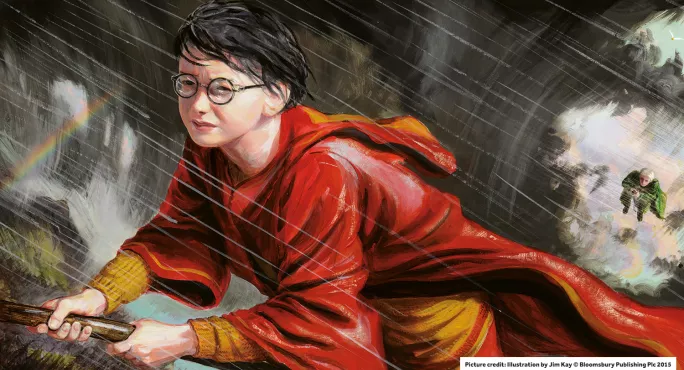- Home
- Is Harry Potter the boy who saved reading?
Is Harry Potter the boy who saved reading?

Harry Potter and the Philosopher’s Stone celebrates its 20th birthday today.
At Hogwarts, birthdays are usually celebrated with a slice of pumpkin pie, a game of wizard chess, and if you’re lucky, a trip to the Three Broomsticks for a Firewhisky or two.
But, at Tes, where the office is a mixture of Harry Potter fanatics, sceptics and (gulp) those who have never actually delved into JK Rowling’s world of witchcraft and wizardry, we’re commemorating the anniversary by asking: is Harry Potter the Boy Who Saved Literacy?
The statistics are, undoubtedly, impressive: seven books, translated into 68 languages, with 400 million copies sold (and still selling) worldwide.
But did the power of Potter really get pupils (and their parents) reading? In the latest issue of Tes, Sarah Cunnane sets out to answer this question.
She gathered an expert panel of muggles - both proud Potterheads and firm disbelievers - to give their opinion on the JK Rowling effect. Here’s what they had to say:
The world-renowned reading specialist
Daniel Willingham, one of the world’s leading cognitive scientists, an expert in reading and a professor of psychology at the University of Virginia, proudly explains that he found the books relatable and enjoyable.
But he dismisses any notion of Harry Potter having a widespread effect on children’s literacy.
“I think the ‘Harry Potter effect’ was the secret hope of parents and teachers trying to find the perfect book for a child. A lot of eager, enthusiastic adult readers had a book like that: they had a book that they fell in love with that told them reading was worth their time,” he says.
“It’s possible that all those people who are enthusiastic adult readers had that magic book, but not all children who have a magic book become eager adult readers.”
The Hazza hater
English teacher Katherine Howard was more than happy to send us a Howler on the subject. She doesn’t own a single Harry Potter novel.
“The vocabulary doesn’t stretch as other literary works manage to do; Harry’s story of success is neither believable or achievable to the average (or less than average) child,” she writes.
“If I work hard enough, I cannot and will not excel at either wizardry or Quidditch - and the obstacles encountered by Harry on his journey during the Hotel Hoggles years does not resonate with me as a child nor adult.”
(Potterheads, before you get overly despondent, remember Albus Dumbledore’s wise words: “Happiness can be found, even in the darkest of times, if one only remembers to turn on the light.”)
The linguist
Jane Sunderland, an honorary reader in linguists and English language at Lancaster University, interviewed hundreds of primary- and secondary-aged children as part of a qualitative survey in 2012-13 to find out about the effect of the books and what children themselves thought.
The survey showed that, actually, about half of the children hadn’t read the books.
In terms of the books’ impact on literacy, Sunderland says it’s difficult to make a distinct pronouncement.
However, the children were asked if they thought that the series had made a difference to their reading and the majority of them said that Harry Potter had helped them to read more fiction, more books and harder books.
The Potterhead teacher
Key stage 3 coordinator, James Tickle - a self-proclaimed Ravenclaw - has been using Harry Potter and the Philosopher’s Stone to teach a scheme of work in Year 7 for the past four years or so (bit.ly/HPlessons).
He says: “It’s a genuine pleasure to explore with pupils - the book is complex enough that you can do so much with it. There’s so many different directions you can go. You can get really creative.’
Tickle credits the series for keeping up his love of reading when it was in danger of falling away.
“Boys tend to drop off reading in the teenage years and then pick it up again a few years later. It did encourage me to go out and find other books, so I didn’t have that break in reading. It helped me longer term,” he says.
Harry Potter and the pupil who loves him
Kathryn is an eight-year-old who’d happily be in Gryffindor (“because they’re brave”) or Ravenclaw (“because they’re clever”).
“The Harry Potter series is amazing. It is one of the best things I’ve ever read. I like it because it’s about people fighting for what they believe in and not giving up,” she says.
So, is Harry the greatest literary hero of the last 20 years? In Kathryn’s view, undoubtedly, yes.
Did he actually save literacy? Perhaps not.
But the effect the books have had on countless individual young (and older) lives? Well, that’s clearly magic.
To read the full feature, you can subscribe here. This week’s Tes magazine is available in all good newsagents. To download the digital edition, Android users can click here and iOS users can click here.
Want to keep up with the latest education news and opinion? Follow Tes on Twitter and Instagram and like Tes on Facebook
Keep reading for just £1 per month
You've reached your limit of free articles this month. Subscribe for £1 per month for three months and get:
- Unlimited access to all Tes magazine content
- Exclusive subscriber-only stories
- Award-winning email newsletters



